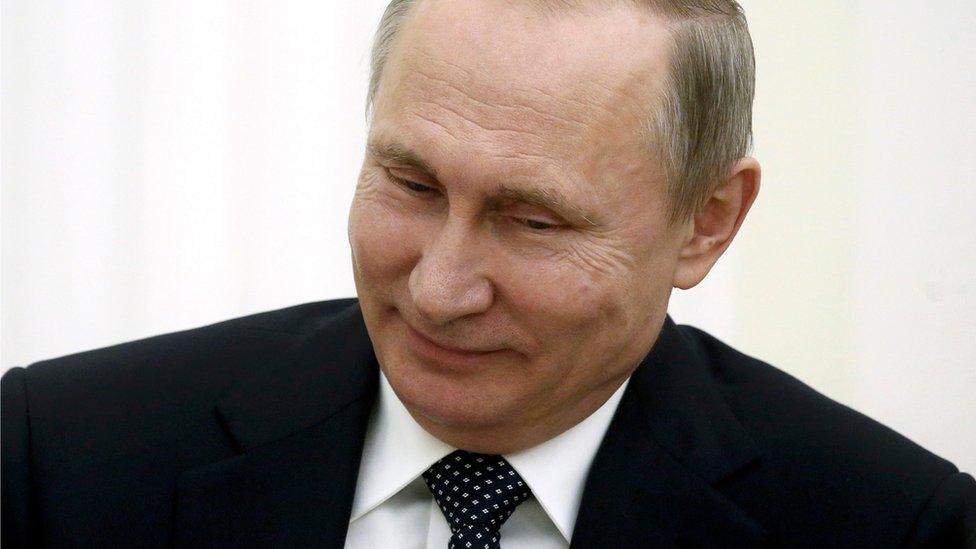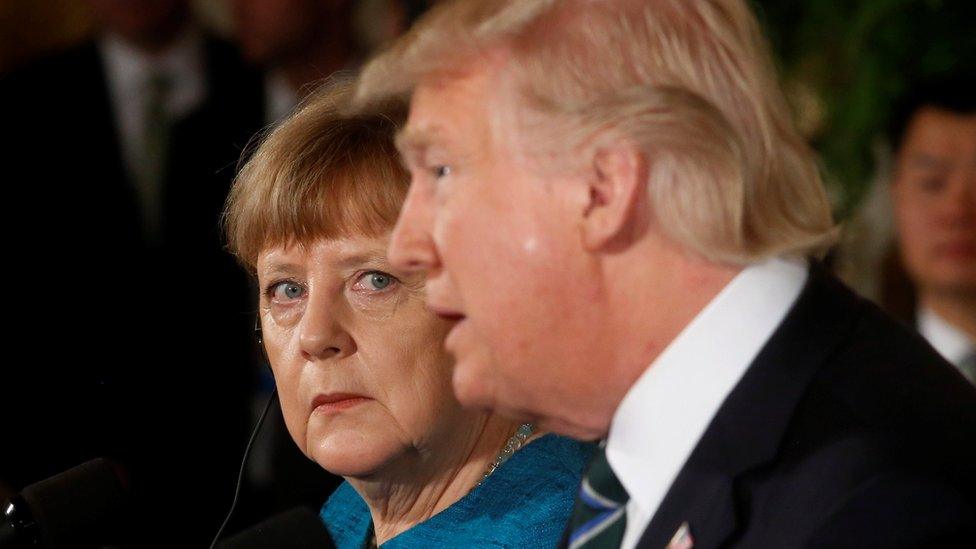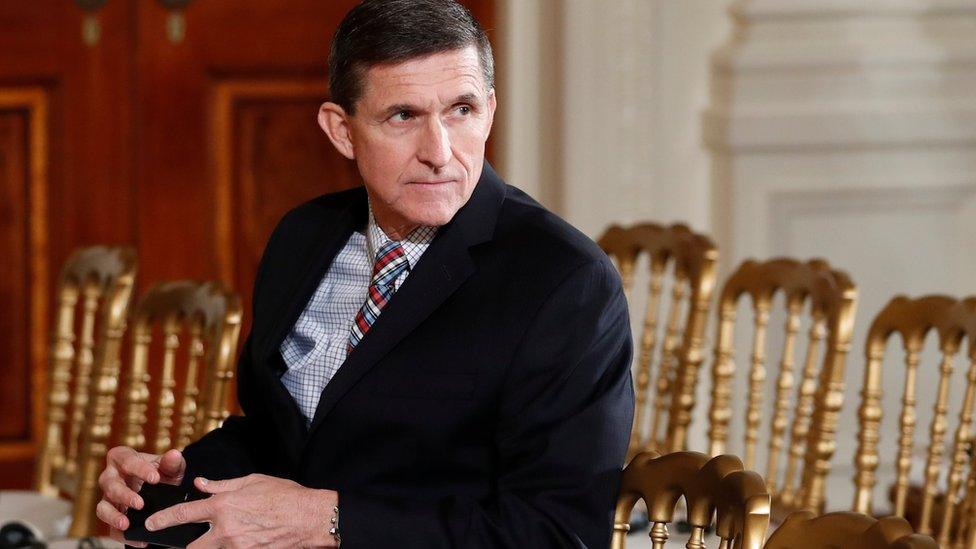Trump Russia claims: FBI's Comey confirms investigation of election 'interference'
- Published
'Putin hates Clinton' and other things the FBI learned about Russia
FBI director James Comey has confirmed for the first time that the FBI is investigating alleged Russian interference in the 2016 election.
However, Mr Comey said his agency had seen no evidence to back up President Trump's claim that his phones had been tapped by the Obama administration.
He was giving evidence to the congressional intelligence committee.
The Trump administration said nothing had changed and there was "no evidence of Trump-Russia collusion".
Russia has always denied attempting to influence the US presidential election.
The FBI investigation would examine possible links between individuals in the Trump campaign and the Russian government and whether there was co-ordination between the Trump campaign and Russia, Mr Comey said.
The FBI would also assess whether crimes were committed, he said.
Mr Comey said the investigation was "very complex" and he could not give a timetable for its completion.
"We will follow the facts wherever they lead," he said.
What FBI director Comey said on Trump, Russia and wiretaps

Mr Putin "hated Mrs Clinton so much" that he had a strong preference for her rival, Mr Comey said
But White House press secretary Sean Spicer suggested the administration was not concerned, saying: "You can continue to look for something, but continuing to look for something that doesn't exist doesn't matter."
National Security Agency (NSA) chief Admiral Mike Rogers also appeared before the committee.
He said the NSA stood by an intelligence community report published in January, which said that Russian President Vladimir Putin had ordered a campaign to harm the campaign of Mr Trump's rival, Hillary Clinton.
'No wiretap on Trump Tower'
Mr Comey said he had no information on unsubstantiated claims tweeted by Mr Trump this month that former President Barack Obama had ordered a wiretap on Trump Tower.
This was despite looking carefully for such evidence, he said. The Department of Justice also had no information, he said.

Analysis - BBC North America reporter Anthony Zurcher

What FBI director James Comey didn't say during intelligence hearings today on possible Russian meddling in the 2016 US election was as important as what he did say.
Former Trump campaign manager Paul Manafort, who had ties to pro-Russian Ukrainian politicians? No comment. Long-time Trump adviser Roger Stone, who reportedly had communications with individuals who hacked the Democratic National Committee emails? No comment. Former National Security Adviser Michael Flynn, who was forced to resign after leaked evidence surfaced that he had communicated with a Russian ambassador about US sanctions? No comment.
"I don't want to answer any questions about a US person," Mr Comey said.
All of this is evidence that the investigation isn't just ongoing, it's substantive and far-reaching.
While Democrats will likely be encouraged by this, it was telling that Republicans pursued the White House line - that the topic of greatest concern was the intelligence leaks that put this story in the headlines.
If Mr Trump can consolidate his party's support, it will go a long way towards insulating the president against any fallout from this investigation.

Meanwhile, Adm Rogers strongly denied that the NSA had asked Britain's GCHQ intelligence agency to spy on Mr Trump - a claim that had been repeated by Sean Spicer.
The allegation "clearly frustrates a key ally of ours", he added.
GCHQ had described the claim as "utterly ridiculous".

Mr Trump raised eyebrows after he suggested both he and Mrs Merkel had been wiretapped by Mr Obama
Mr Trump's recent joke about how Mr Obama had wiretapped both German Chancellor Angela Merkel and him "complicates things" with an ally, Adm Rogers added.
However, Devin Nunes, the Republican chairman of the House of Representatives Intelligence Committee, said it was still possible that other surveillance activities had been used against Mr Trump and his associates.
What are the allegations?
In January, US intelligence agencies said Kremlin-backed hackers had broken into the email accounts of senior Democrats and released embarrassing messages in order to help Mr Trump defeat Hillary Clinton.
"That was a fairly easy judgement for the community," Mr Comey said. "Putin hated Secretary Clinton so much that the flipside of that coin was he had a clear preference for the person running against the person he hated so much."
However, late last summer the Russians concluded that Mr Trump had no chance of winning, based on polls at the time, and so focused on undermining Mrs Clinton, Mr Comey said.
Trump's wiretap saga explained in two minutes
Both intelligence chiefs said that Russia had made its intervention in last year's election campaign unusually obvious, perhaps to further its aim of undermining US democracy.
Mr Comey said Russia had succeeded in this goal, by sowing chaos, division and discord.
Mr Trump has since faced allegations that his campaign team had links to Russian officials.
Former Director of National Intelligence James Clapper has said he saw no evidence of any collusion, up until the time he left his post in January.
Which campaign members have been accused of deception?
Two senior officials in the Trump administration have been caught up in the allegations - former national security adviser Michael Flynn, and Attorney-General Jeff Sessions.
Mr Flynn was fired last month after he misled the White House about his conversations with the Russian ambassador before he was appointed national security adviser.

Michael Flynn encouraged a softer policy on Russia and a harder line on Iran
He allegedly discussed US sanctions with ambassador Sergei Kislyak. It is illegal for private citizens to conduct US diplomacy.
Meanwhile, Mr Sessions was accused by Democrats of lying under oath during his confirmation hearing in January.
He said he had "no communications with the Russians", but it later emerged that he had met Mr Kislyak during the campaign.
Mr Sessions denied any wrongdoing, but removed himself from any FBI inquiry into Russia's alleged interference.